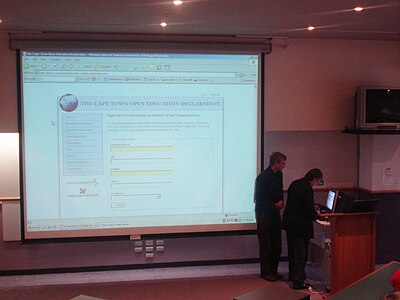Setting the Scene
From WikiEducator
| Otago Polytechnic IP Policy Resource | |
|---|---|
| Introduction | Video Signpost | Setting the Scene | Self Reflection Exercise | What are OERs? | Why OERs? | Sustainable Education | The IP Policy | Mini Quiz | OER at Otago Polytechnic | |

May 2008: Otago Polytechnic's Chief Executive signs the Capetown Declaration, making an institution-wide commitment to "accelerate efforts to promote open resources, technology and teaching practices in education"
This staff resource was created in response to Otago Polytechnic's revised intellectual property policy, which signals a move towards the principles of open education. This policy has dramatic implications for all teaching staff.
In summary:
- In 2009, Otago Polytechnic became the first tertiary educational institution in the world to adopt an intellectual property (IP) policy that actively encourages the creation and use of open educational resources (OERs) by academic staff.
- To operate effectively in this learning environment, OP academic staff need a basic working knowledge of copyright, content licensing and open educational resources and how these apply to research, course preparation and delivery.
- Otago Polytechnic’s IP policy provides a recommended IP licensing framework for staff who are publishing their own research or educational resources. The license type is important because it determines what users of your IP can legally do with it.
- With its emphasis on ‘open’ licenses, the updated IP policy will lead to greater educational freedom for educators and learners alike, both within and beyond Otago Polytechnic.
- This guide introduces you to what you need to know to understand the issues and embrace the opportunities provided by OER. It is a prelude to the more comprehensive Open Content Learning for Educators Workshop (OCL4ed), which is highly recommended for all academic staff as part of their professional development.